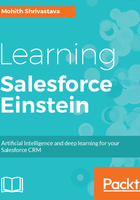
Introduction to AI
AI stands for Artificial Intelligence and it’s been widely used in our daily life. Whether you are using Siri on your MacBook, Cortana on your Windows, playing Call of Duty, driving a smart car, or using movie recommendation services, all use Artificial Intelligence to a great extent to predict the outcome. Artificial Intelligence powers e-commerce Recommendation feeds, Facebook feeds, Fraud Detection in banking transactions, and many more use cases.
Salesforce CRM is one of the widely used CRMs today and there are tons of applications that are built on top of the Salesforce App Cloud platform used across various verticals, such as healthcare (Salesforce Health Cloud), finances (Financial Cloud and Financial Force ), insurance (Vlocity), and so on. Adding Artificial Intelligence to these types of applications will make the CRM and apps smarter. This book is an attempt to introduce developers on the Salesforce platform, the capabilities of the Salesforce Einstein (Artificial Intelligence for CRM), to bring Artificial Intelligence into the Salesforce apps, and also to introduce how Einstein can be used across marketing, sales, service, community, and various other Cloud offerings of Salesforce. We also cover PredictionIO, which is an open source machine learning server to build smarter applications.
Before we deep dive into Einstein offerings for developers and data scientists, this chapter covers the basics of Artificial Intelligence and key terminology in the world of Artificial Intelligence. Also, we will see how to use Google Prediction API’s to build a simple demonstration of machine learning and Artificial Intelligence in conjunction with the Salesforce data to support the relevant theory.
In this chapter, we will cover the following topics:
- Artificial Intelligence key terms
- Programming languages used for machine learning
- Practical machine learning with Google Prediction API and Salesforce